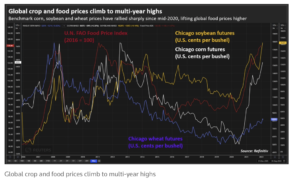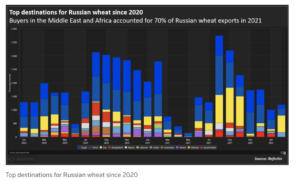Congress has quickly engaged in putting together potential aid packages for farmers that would more than double the Trump administration's $12 billion under the Farmer Bridge Assistance (FBA) Program.
Russia, Ukraine Conflict Escalates, Ripple Effects Could Include Impacts on Food Prices, Production, and Fertilizer
Robyn Dixon, Paul Sonne and Ellen Nakashima reported on the front page of Tuesday’s Washington Post that, “Russian President Vladimir Putin on Monday recognized the independence of two Moscow-backed separatist regions in eastern Ukraine and ordered Russian forces onto their territory for ‘peacekeeping’ purposes, a dramatic escalation in a crisis that is threatening a full-scale war.”
Reuters writers Naveen Thukral and Gavin Maguire reported on Tuesday that, “Escalating tensions between global crop heavyweights Russia and Ukraine are likely to force wheat, corn and sunflower oil buyers to seek alternative shipments, driving up world food prices already near multi-year highs, analysts and traders said.”

The Reuters article pointed out that, “With the two countries accounting for around 29% of global wheat exports, 19% of world corn supplies, and 80% of world sunflower oil exports, traders worried that any military engagement could impact crop movement and trigger a mass scramble by importers to replace supplies from the Black Sea region.”
Thukral and Maguire added that, “Around 70% of Russia wheat exports went to buyers in the Middle East and Africa in 2021, according to Refinitiv shipping data.”

“A lack of supplies from the Black Sea region could lift demand for the bread-making ingredient from the United States and Canada,” the Reuters article said.
Associated Press writer Isabel Debre reported over the weekend that, “American wheat farmers will boost production and prevent supply chain problems in the event that a possible Russian invasion of Ukraine chokes off agricultural exports from the global grains powerhouse, the U.S. secretary of agriculture said on Saturday.
“During a trade mission to the United Arab Emirates, U.S. Secretary of Agriculture Tom Vilsack told The Associated Press that a conflict in Ukraine would present an ‘opportunity, obviously, for us to step in and help our partners, help them through a difficult time and situation.'”
Meanwhile, Patricia Cohen and Jack Ewing reported in Tuesday’s New York Times that, “Ukraine, long known as the ‘breadbasket of Europe,’ actually sends more than 40 percent of its wheat and corn exports to the Middle East or Africa, where there are worries that further food shortages and price increases could stoke social unrest.
“Lebanon, for example, which is experiencing one of the most devastating economic crises in more than a century, gets more than half of its wheat from Ukraine, which is also the world’s largest exporter of seed oils like sunflower and rapeseed.”
And Bloomberg writers Anna Shiryaevskaya, Mark Burton, and Megan Durisin reported on Tuesday that,
So far, cargoes are still flowing freely and there’s no indication of significant disruptions.
“But should that happen, global markets already grappling with shrinking grain stockpiles could see further shortfalls.
“Russia is also one of the world’s biggest exporters of all three major groups of fertilizers. Any cuts in supply may result in a surge in already high nutrient prices, affecting crop yields and cause further food inflation.“





